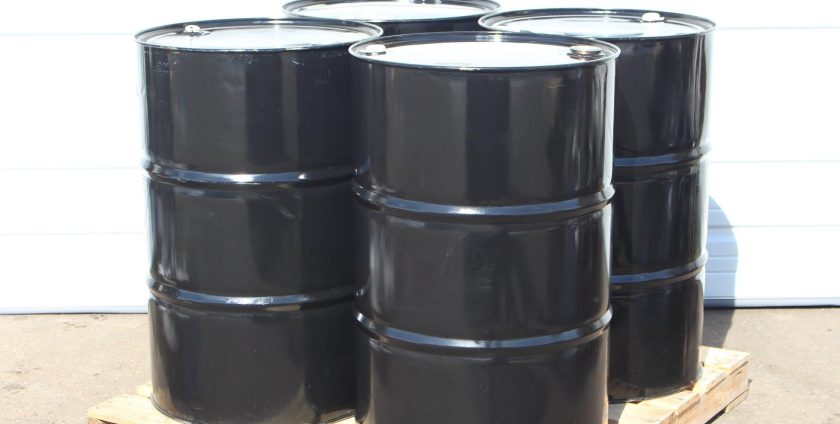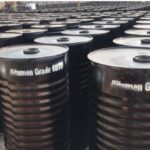
Specifications of Viscosity Grade Bitumen
Viscosity Grade Bitumen (VG Bitumen) is a refined petroleum binder used in road construction and industrial applications. Classified primarily by its viscosity at 60°C, it ensures consistent performance in hot and moderate climates.
This blog will delve into the details of Viscosity Grade Bitumen, exploring its specifications, types, applications, advantages, disadvantages, and future prospects. Additionally, we will highlight why Peak Universal Business is the best choice as your VG Bitumen supplier.
🔬 What Is Viscosity Grade Bitumen?
Viscosity Grade Bitumen (VG Bitumen) is a specific type of bitumen categorized based on its viscosity. Viscosity is a measure of a fluid’s resistance to flow, and in the case of bitumen, it indicates how thick or thin the material is at a given temperature. VG Bitumen is produced by refining crude oil and is used primarily in road construction due to its excellent binding and waterproofing properties.
⚙️ Types and Specifications of VG Bitumen
📊 Common Grades of VG Bitumen
| Grade | Viscosity @ 60°C (Poise) | Penetration @ 25°C (mm/10) | Softening Point (°C) | Typical Application |
|---|---|---|---|---|
| VG-10 | 800–1,200 | 80–100 | 40–50 | Cold regions, sprayed sealing, surface coat |
| VG-20 | 1,600–2,400 | 60–80 | 50–60 | Moderately warm climates |
| VG-30 | 2,400–3,600 | 50–70 | 55–65 | High traffic roads, hot climates |
| VG-40 | 3,200–4,800 | 40–60 | 60–70 | Industrial use, heavy-duty pavements |
VG Bitumen is classified into different grades based on its viscosity, which is measured at 60°C. The main grades are VG-10, VG-20, VG-30, and VG-40. Each grade has specific properties and applications:
1. VG-10
- Viscosity: 800-1200 Poise
- Penetration: 80-100 dmm
- Softening Point: 40-50°C
- Applications: Cold climates, spraying applications, surface dressing
2. VG-20
- Viscosity: 1600-2400 Poise
- Penetration: 60-80 dmm
- Softening Point: 45-55°C
- Applications: Moderately cold climates, paving applications
3. VG-30
- Viscosity: 2400-3600 Poise
- Penetration: 50-70 dmm
- Softening Point: 50-60°C
- Applications: Hot climates, heavy traffic roads, and highways
4. VG-40
- Viscosity: 3200-4800 Poise
- Penetration: 40-60 dmm
- Softening Point: 55-65°C
- Applications: Very hot climates, heavy traffic roads, airports, and industrial areas
Production Process of Viscosity Grade Bitumen
The production of VG Bitumen involves several key steps:
- Distillation: Crude oil is heated and distilled to separate lighter fractions from heavier ones. The heavier fractions are further processed to produce bitumen.
- Oxidation: The heavy distillates are oxidized to achieve the desired viscosity and other properties. This process involves blowing air through the bitumen at high temperatures.
- Blending: Additives may be blended into the bitumen to enhance its performance characteristics, such as improving its resistance to temperature changes and oxidation.
- Quality Control: The final product undergoes rigorous quality control tests to ensure it meets the required specifications for its viscosity grade.
🏗️ Key Industrial Applications of VG Bitumen
Road & Highway Construction
VG Bitumen is the primary binder in hot mix asphalt (HMA) for roads and highways, especially under heavy traffic loads.
Surface Dressing & Seal Coating
VG-10 and VG-20 are commonly used for thin overlays, surface treatment, and spray sealing in moderate and cold regions.
🏗️ Industrial Applications
VG-40 is used in airports, ports, container yards, and parking areas due to its hardness and durability.
VG Bitumen is used in a variety of applications due to its excellent binding, adhesive, and waterproofing properties. Some of the primary applications include:
1. Road Construction
VG Bitumen is extensively used in road construction for:
- Paving: VG Bitumen provides strong adhesion between aggregate particles, creating durable and smooth road surfaces.
- Surface Dressing: It is used in surface dressing to create skid-resistant road surfaces, extending the life of the pavement.
- Bituminous Macadam: VG Bitumen is mixed with aggregates to produce bituminous macadam, which is used for constructing base and binder courses.
2. Waterproofing
VG Bitumen is used in waterproofing applications to protect structures from water ingress. It is applied as a coating on roofs, basements, and bridges to create a waterproof barrier.
3. Industrial Applications
VG Bitumen is also used in various industrial applications, including:
- Adhesives: It is used as a binder in the production of adhesives for construction and industrial use.
- Sealants: VG Bitumen is used in sealants to provide waterproofing and protection against environmental factors.
- Insulation: It is used in insulation materials to provide thermal and moisture resistance.
💡 Advantages of Viscosity Graded Bitumen
| Feature | Benefit |
|---|---|
| Viscosity-based classification | Better performance consistency across temperatures |
| High thermal resistance | Ideal for tropical and hot climates |
| Low temperature susceptibility | Prevents rutting and cracking |
| Standardized testing (IS 73:2013) | Ensures quality and conformity |
| Versatile applications | Suitable for roads, runways, ports, and industrial use |
VG Bitumen offers several advantages, making it a preferred choice in various applications:
1. Consistent Quality
VG Bitumen provides consistent quality due to its standardized production process and rigorous quality control measures.
2. Enhanced Durability
VG Bitumen enhances the durability of pavements and structures by providing strong adhesion, flexibility, and resistance to environmental factors.
3. Versatility
VG Bitumen is versatile and can be used in a wide range of applications, from road construction to waterproofing and industrial use.
4. Cost-Effective
VG Bitumen is cost-effective compared to other materials with similar properties, making it an economical choice for various applications.
⚠️ Disadvantages of Viscosity Grade Bitumen
| Disadvantage | Description |
|---|---|
| Limited Low-Temperature Performance | VG Bitumen can become brittle in extremely cold climates, leading to cracking. |
| Higher Production Cost | Manufacturing and viscosity testing increase the cost compared to Pen Grade. |
| Requires Precise Heating & Handling | Improper heating may affect viscosity and performance. |
| Less Suitable for Modified Bitumen Blends | Not ideal as a base for certain polymer-modified bitumen formulations. |
| Regional Standardization Limitations | VG classification is not yet adopted globally like Penetration Grades. |
Despite its many advantages, VG Bitumen also has some disadvantages:
1. Temperature Sensitivity
VG Bitumen can be sensitive to temperature changes, affecting its performance in extreme climates.
2. Environmental Impact
The production and use of VG Bitumen can have environmental impacts, including the emission of greenhouse gases and the potential for pollution.
3. Handling and Storage
VG Bitumen requires careful handling and storage to prevent it from becoming too hard or too soft, which can affect its performance.
Future Prospects of Viscosity Grade Bitumen
The future prospects of VG Bitumen are promising, with ongoing research and development aimed at improving its properties and expanding its applications. Some potential future developments include:
1. Enhanced Formulations
Research is focused on developing enhanced formulations of VG Bitumen that offer improved performance, such as greater resistance to temperature changes and increased durability.
2. Sustainable Production
Efforts are being made to develop more sustainable production processes for VG Bitumen, reducing its environmental impact and promoting eco-friendly practices.
3. New Applications
Innovations in material science are exploring new applications for VG Bitumen, including its use in advanced construction materials and high-performance coatings.
Price Factors of Viscosity Grade Bitumen
The price of VG Bitumen is influenced by several factors, including:
1. Crude Oil Prices
The cost of crude oil, the primary raw material for VG Bitumen, has a significant impact on its price. Fluctuations in crude oil prices can directly affect the cost of VG Bitumen.
2. Production Costs
The costs associated with refining, processing, and quality control of VG Bitumen contribute to its final price. Advanced refining techniques and higher quality control standards can increase production costs.
3. Transportation Costs
The cost of transporting VG Bitumen from production sites to end-users can affect its price, especially for international shipments.
4. Supply and Demand
Market dynamics of supply and demand play a crucial role in determining the price of VG Bitumen. Increased demand or reduced supply can lead to higher prices.
5. Geopolitical Factors
Geopolitical events and trade policies can influence the availability and cost of VG Bitumen on the global market.
Why Choose Peak Universal Business as Your VG Bitumen Supplier?
Peak Universal Business is a leading supplier of high-quality VG Bitumen. Here’s why you should choose them for your VG Bitumen needs:
1. Quality Assurance
Peak Universal Business is committed to providing products that meet the highest quality standards. Their VG Bitumen undergoes rigorous testing to ensure it meets the required specifications and performs reliably in various applications.
2. Industry Expertise
With extensive experience in the industry, Peak Universal Business has a deep understanding of the diverse applications and requirements of VG Bitumen. They can offer expert guidance and support to help you find the right solution for your needs.
3. Reliable Supply Chain
Peak Universal Business has a robust supply chain that ensures timely delivery of products. Their global reach and efficient logistics enable them to meet the demands of clients worldwide.
4. Customer-Centric Approach
Customer satisfaction is a top priority for Peak Universal Business. They strive to build long-term relationships with their clients by offering personalized service, competitive pricing, and reliable support.
5. Sustainable Practices
Peak Universal Business is committed to sustainable practices, including the use of eco-friendly materials and production processes. They are dedicated to minimizing their environmental impact and contributing to a greener future.
❓ FAQ: Viscosity Grade Bitumen
What does VG in VG Bitumen stand for?
VG stands for Viscosity Grade, which classifies bitumen based on its flow behavior at standard temperatures.
What is the difference between VG-30 and VG-40?
VG-30 is used for high-traffic flexible pavements, while VG-40 is ideal for very high stress areas like expressways and industrial floors.
Is VG Bitumen better than Penetration Grade?
Yes. VG Bitumen offers more accurate performance metrics in varying climates and is preferred for modern construction standards.
Can VG Bitumen be used in cold climates?
Yes, particularly VG-10, which performs well in colder regions due to its softer grade and better workability.
How is VG Bitumen tested?
Using viscometers to measure flow resistance at 60°C and 135°C, along with softening point and penetration tests.
🔚Conclusion: Specifications of Viscosity Grade Bitumen
Viscosity Grade Bitumen (VG Bitumen) is an essential material used in a variety of applications, from road construction to waterproofing and industrial processes. Its unique properties, including excellent binding, adhesive, and waterproofing capabilities, make it a preferred choice in many industries.
While VG Bitumen offers numerous advantages, such as consistent quality, enhanced durability, versatility, and cost-effectiveness, it also has some disadvantages, including temperature sensitivity and environmental impact. However, ongoing research and development promise to address these issues and enhance the future prospects of VG Bitumen.
When looking for a reliable VG Bitumen Supplier, Peak Universal Business stands out with their commitment to quality, industry expertise, and customer-centric approach. Whether you need VG Bitumen for road construction, waterproofing, or industrial applications, Peak Universal Business is your trusted partner for high-quality solutions.
By choosing Peak Universal Business, you can be assured of receiving the best products and services tailored to your specific needs, helping you achieve optimal results in your industrial processes.
📣Call to Peak Universal Business:
Source High-Quality VG Bitumen Today
🔍 Looking for premium VG-10, VG-30, or VG-40 Bitumen?
We in Peak Universal Business, supply globally certified bitumen conforming to IS 73:2013 standards for all industrial and road construction needs.
👉 Request a Quote Today
📧 Email: [email protected]
📞 Phone: +971 4 878 2031
🌐 Visit: VG-Grade-Bitumen/
📦 Bulk & International Shipping Available
If You have any other Query or Question you want to ask, Please don’t hesitate to Contact Us.
- 0 comment





Leave a Reply